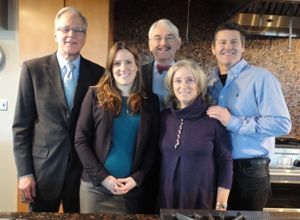Managing Change
01 March 2014
 CAFÉ’s second-annual Deans and Directors Retreat in February introduced a stellar line-up of thought leaders to passionate educators wishing to grow and strengthen their culinary-arts programs amid sweeping societal evolution.
CAFÉ’s second-annual Deans and Directors Retreat in February introduced a stellar line-up of thought leaders to passionate educators wishing to grow and strengthen their culinary-arts programs amid sweeping societal evolution.
By Brent T. Frei
Approximately 40 people attended CAFÉ’s 2nd-annual Deans and Directors Retreat, held Feb. 22-23 at Kendall College in Chicago. Like last year’s inaugural event, this year’s was marked by tremendous interaction among program leaders who shared best practices in culinary education.
Attendees included Kirk Bachmann, M.Ed., CEC, AAC, president of Le Cordon Bleu College of Culinary Arts in Chicago; Eric Frauwirth, Ed.D., dean of Stratford University’s Baltimore campus; Jim Gallivan, MAT, CCA, CCP, CFBE, culinary-arts chair at The Art Institute of Atlanta; and Dorothy Johnston, CEC, CCE, AAC, hospitality-management chair and instructor at Erie Community College in Buffalo, N.Y.
The weekend was preceded by the “Bringing Idaho to Chicago” evening reception sponsored by Idaho growers, represented by the Idaho Potato Commission, Idaho-E. Oregon Onion Committee and others, at which several members of national foodservice media (including Patricia Cobe and Tom O’Brien of Restaurant Business magazine and Chandra Ram of Plate magazine) were present.
With the theme of “Managing Change,” the line-up of presenters challenged attendees to consider the cost of culinary education vs. value delivered in light of new technologies, foodservice trends (and fads) and the current mindsets and needs of Millennials and other adult-learner groups.
First-day keynoter Dr. Fred Mayo, CHE, CHT, of Mayo Consulting Services launched the program with “Loving and Leading Change.” Citing that 70% of all major change efforts in organizations fail because organizations often do not take the holistic approach to see the change through, Mayo presented several models of change and provided suggestions for creating vision, bringing that vision in line with superiors and subordinates, and ensuring that the changes made to fit the vision have a long shelf life.
Don Odiorne representing CAFÉ sponsor the Idaho Potato Commission led a panel discussion on “Leadership and Change” to include the topics of building an online community via student and faculty blogging, the employee needs and strengths of large-volume chain operators, and the opportunities within noncommercial foodservice, particularly healthcare, college/university, business and industry and K-12. Panelists were John Lawn, editor-in-chief of Food Management magazine; Patti Londre, publisher of food/travel blog “Worth the Whisk” and producer of Camp Blogaway, the Original Bootcamp for Food & Recipe Bloggers; and Kevin Ryan, CEO and executive director of the International Corporate Chefs Association.
“Tools to Assess Culinary Trends” was presented by Karl Guggenmos, MBA, AAC, university dean of culinary development for Johnson & Wales University and a WACS Global Master Chef, who spoke on differentiating foodservice trends from fads (sustainability, health and wellness, etc.), identifying the temporary vs. the long term, and how to make informed decisions relating to operations and the curriculum.
Paul Sorgule, MS, AAC, president of Harvest America Ventures, former vice president of New England Culinary Institute and former dean at Paul Smith’s College, discussed the very real challenges culinary-arts programs are faced with in “Determining the Value of Culinary Education.” His presentation also highlighted a succinct method for assessing where each program currently sits and a baseline for future discussion on how to move a program forward with a positive value statement to all stakeholders in the process.
An encore presentation by Mayo focused on “Making Change with Your Team,” during which he outlined specific examples of change and engaged attendees to ideate methods of engaging their own staffs in problem solving and visioning.
Sunday’s keynoter was Dr. Robert Roehrich of Synergistic Strategies Consulting, who drew on the experiences of attendees and pushed them to examine what success looks like in terms of retention, completion and their relationship to revenue and funding. Roehrich also shared examples of his own successful approaches and how they taught him to anticipate the challenges that change brings. Exercises conducted with attendees shed light on how to keep success goals in mind.
The second-annual Deans and Directors Retreat concluded with a presentation by Randall Sansom, chief academic officer and corporate executive chef for Triumph Higher Education’s www.escoffierline.com. In a rousing and fast-paced segment, Sansom brought attendees up to date on what is and isn’t working with the sudden embracing of social media, both in and out of the classroom. Using specific examples of successful uses by culinary-arts programs in both pre-admission, student and graduate relationships, Sansom worked one on one with attendees to put their own social-media attempts and practices into perspective.
To view photos of presenters, attendees, guests and sponsors of this year’s Deans and Directors Retreat, click here. The next CAFÉ event will be the 10th-annual Leadership Conference in Salt Lake City, June 19-21, 2014. Click here for more information.
Photo:Thanks to support from Mercer Cutlery and its Speaker Series, CAFÉ’s 2nd-annual Deans and Directors Retreat enlisted several top presenters on leading education topics. Pictured (l. to r.): Dr. Robert Roehrich, Synergistic Strategies Consulting; Katie Adams, Mercer Cutlery; Dr. Fred Mayo, Mayo Consulting Services; Mary Petersen, CAFÉ; and Kim de la Villefromoy, Mercer Cutlery (www.mercercutlery.com). Courtesy of B. Frei
